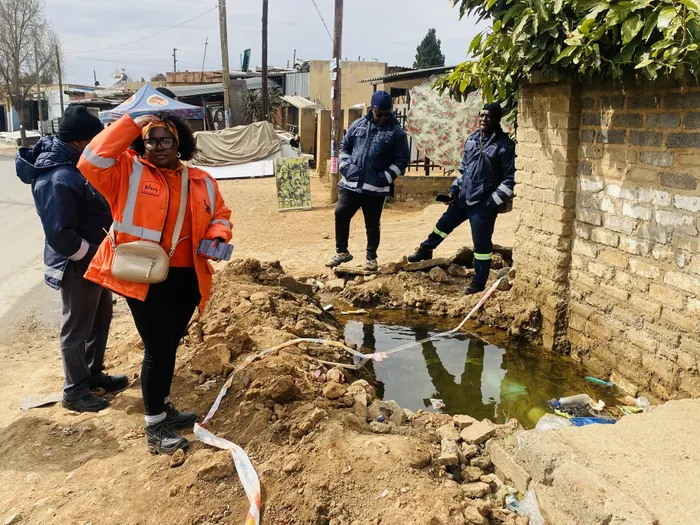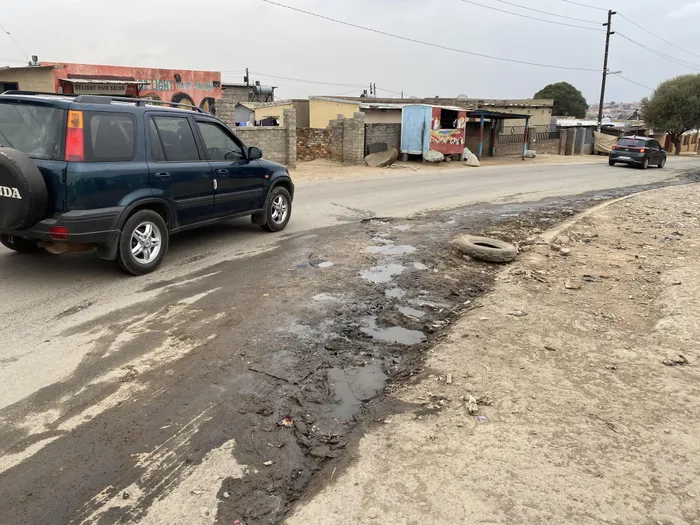‘It’s not us, it’s you’: Mayor Morero gaslights Cosmo City over potholes, blames residents

Cosmo City residents are furious after Joburg mayor Dada Morero has put the blame on them over the issue of potholes in the are.
Image: Simon Majadibodu/IOL
City of Joburg Mayor Dada Morero and Johannesburg Roads Agency (JRA) CEO Zweli Nyathi say the pothole crisis in Cosmo City is caused by residents, illegal car washes, and overcrowding, rather than failing infrastructure.
Morero led the “War on Potholes” operation in the area on Thursday.
The initiative aims to repair potholes and resurface roads across the city.
Cosmo City is among several areas battling poor service delivery, including pothole-riddled roads, persistent sewer spills, and blocked stormwater drains.
Morero denied that the issue was a service delivery failure, instead blaming bylaw violations and illegal developments.
“No, it's not a service delivery crisis. It's by-law enforcement. All the damages we’ve seen here are the result of the community’s actions, not infrastructure failure,” he said.
“There are high levels of encroachment, illegal connections, and sewer lines connected to stormwater drains. We must address those issues first.”
Morero said resolving these issues would make it easier to reinstate and maintain existing infrastructure.
“The programme is mainly about bylaw enforcement. We’re bringing in the Metropolitan Police Department Services (MPDS) from tomorrow and will focus on enforcing the law,” he added.
“We are meeting with the Department of Development Planning to deal with encroachment, which is very high and concerning in this area.”
Morero also blamed the rapid, unregulated population growth in Cosmo City for the degradation of infrastructure.
“There’s uncontrolled population growth, contributing significantly to the strain on infrastructure. Illegal structures have been built to accommodate more tenants and boost rental income, but without following regulations.”
During the campaign, potholes were patched on Central African Republic, Sierra Leone, United States of America, Wyoming, Tanzania, and Angola streets.
JRA CEO Zweli Nyathi echoed Morero’s sentiments, arguing that illegal water connections and car washes are responsible for many road defects.
“The water we’re seeing here is not groundwater, it's grey water from sewers, car washes and similar sources. As you can see behind me, car wash operators are dumping water on the road, which then runs down the slope and causes erosion,” said Nyathi.
He added that many houses in the area have illegal “dumping” pipes discharging directly onto roads.
“Constant water flow on the road erodes the surface underneath, damaging the bitumen. This isn’t natural - it’s man-made damage from illegal connections,” he said.
“We need to enforce building control and shut down illegal car washes, or ensure they dispose of water properly into drainage systems.”

City of Joburg Mayor Dada Morero and Johannesburg Roads Agency (JRA) boss says the potholes in Cosmo City are not due to failing infrastructure, but rather the result of residents, car washes, and overcrowding in the area.
Image: Simon Majadibodu/IOL
However, residents rejected the city’s explanation, accusing officials of deflecting blame for years of poor service delivery and substandard road construction.
“They can’t blame us for potholes. We have been complaining about them for years,” said Samuel Malapane, a resident from Extension 6.
“They’re the ones who hire inexperienced contractors. Now they want to blame us.”
A car wash operator on Central African Republic Street, who refused to be named, also defended the community.
“Whether we wash cars here or not, there are potholes all over Johannesburg, even in areas without car washes,” he said.
“The roads were not built properly. The city failed to do its job, and now they’re blaming the residents,” he told IOL News.
When asked how much has been allocated to address the potholes in the area, city official Dlamini said the budget depends on the extent of the damage.
“It’s informed by technical assessments. There is not a fixed amount,” he said.
“Each road is assessed and costed based on the required work. For example, fixing one street could cost around R3 million.”
“Some roads may require reworking the land to allow proper drainage, so water flows into stormwater drains instead of across the road surface,” he explained.
The City of Johannesburg has long struggled with service delivery, with potholes, power outages, and water shortages plaguing various communities across the metro.
simon.majadibodu@iol.co.za
IOL Politics